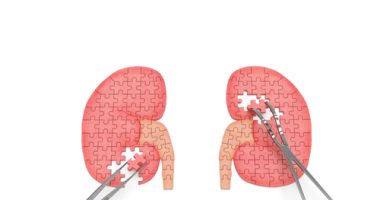Regulus Pauses Clinical Program of RG-012 as Treatment for Alport Syndrome

Regulus Therapeutics has suspended recruitment activities for the RG-012 clinical program in patients with Alport syndrome. This decision was one of the strategic updates and corporate restructuring measures that the company took with the goal of extending its cash availability.
The recruitment of participants for RG-012 clinical studies will be temporarily discontinued until Regulus redefines its collaboration with Sanofi, with whom it is conducting the Phase 2 HERA study (NCT02855268).
“I am very disappointed that we need to take these drastic steps to preserve our capital, especially given the significant contributions by our dedicated employees to the progress made toward unlocking the potential of targeting microRNAs,” Jay Hagan, president and CEO of Regulus, said in a press release.
Despite this setback, preliminary results from the first patients treated with RG-012 revealed encouraging data.
An analysis of kidney tissue biopsies showed positive effects that could predict therapeutic benefits based on previous data collected from animal models of Alport syndrome. In addition, researchers confirmed that the investigative drug did change the levels of its target, further demonstrating it specificity.
RG-012 was designed to block the activity of a small RNA molecule called miR-21, which researchers believe takes part in the development of kidney tissue scarring (fibrosis) and damage.
The clinical candidate had received orphan drug status from the both the U.S. Food and Drug Administration and the European Commission as a potential therapy for a rare disease.
The company also announced that it has decided to voluntarily pause its Phase 1 multiple ascending dose (MAD) study for RGLS4326 in healthy volunteers.
This decision was based on unexpected observations in a 27-week mouse chronic toxicity study, which had been designed to support a future Phase 2 proof-of-concept trial in autosomal dominant polycystic kidney disease (ADPKD). The Phase 2 trial was planned to be initiated in mid-2019.
The recent toxicity results were unexpected, as previous studies using similar or the same tested doses had revealed a favorable safety profile of the investigative drug, which supported the Investigational New Drug application (IND) and Phase 1 program.
“In the near-term, we will concentrate our efforts on investigating the unexpected mouse toxicity findings in our RGLS4326 program, advancing our hepatitis B virus programs, and looking for additional ways to improve shareholder value,” Hagan said.
After discussions with the FDA, Regulus decided to begin investigative studies to further evaluate these unexpected toxicity findings. The company is also planning a new 27-week chronic toxicity mouse study with specific protocol changes.
Regulus is currently conducting a 40-week chronic toxicity study in non-human primates, which has not raised significant safety issues so far. In addition, results from a Phase 1 single ascending dose (SAD) trial and preliminary data of the Phase 1 MAD trials showed that RGLS4326 was generally safe and well-tolerated.
RGLS4326 was designed to block the activity of miR-17 specifically in the kidney, preventing the formation of cysts and proliferation of its cells.
Regulus is laying off about 60 percent of its workforce and focusing its preclinical research efforts on its hepatitis B program, as well as pausing recruitment activities in the RG-012 program for Alport syndrome, to save more than $20 million, the company said.







Comments